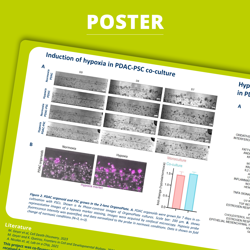 Pancreatic Ductal Adenocarcinoma (PDAC) is a gland-forming malignancy and an aggressive cancer that is most frequently detected at advanced stages. By 2030, PDAC is expected to become the second most common cause of cancer-related deaths. This type of tumor is characterized by a high-density stroma and hypovascularization, which leads to high tissue interstitial pressure and hypoxia. These features may make chemotherapeutic drugs ineffective and highlight the urgent need for new PDAC screening platforms.
Pancreatic Ductal Adenocarcinoma (PDAC) is a gland-forming malignancy and an aggressive cancer that is most frequently detected at advanced stages. By 2030, PDAC is expected to become the second most common cause of cancer-related deaths. This type of tumor is characterized by a high-density stroma and hypovascularization, which leads to high tissue interstitial pressure and hypoxia. These features may make chemotherapeutic drugs ineffective and highlight the urgent need for new PDAC screening platforms.
In this poster, we present the generation of PDAC organoid cultures grown in co-culture with stromal cells such as pancreatic stellate cells (PSCs) in the 2-lane OrganoPlate® 96 to explore hypoxia-induced transcriptional changes. This poster highlights that the OrganoPlate® platform is perfectly applicable for (co-)cultivation and high-throughput phenotypic drug screening of PDAC organoids and that it has the potential to enable the development of novel in-vivo-like model systems for efficient patient stratification and drug discovery.
Download the poster here
